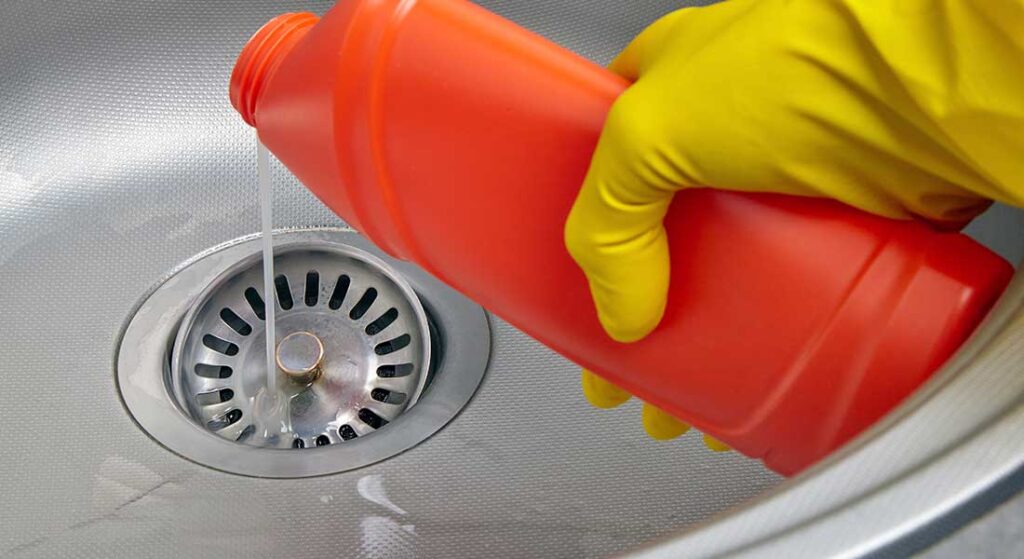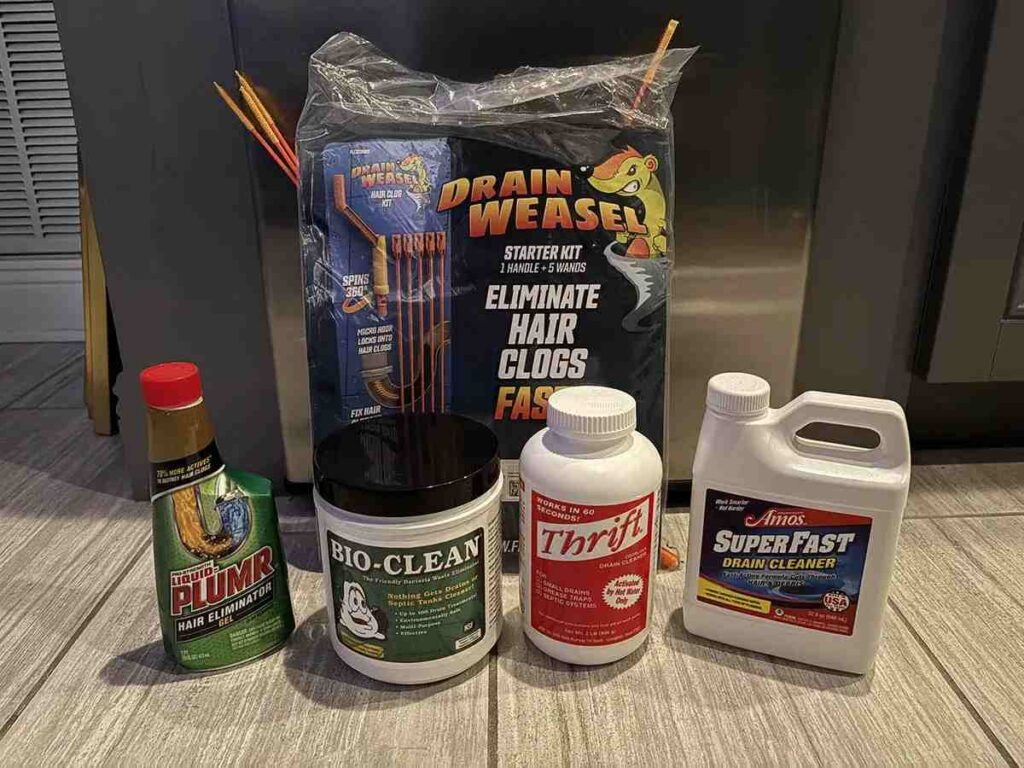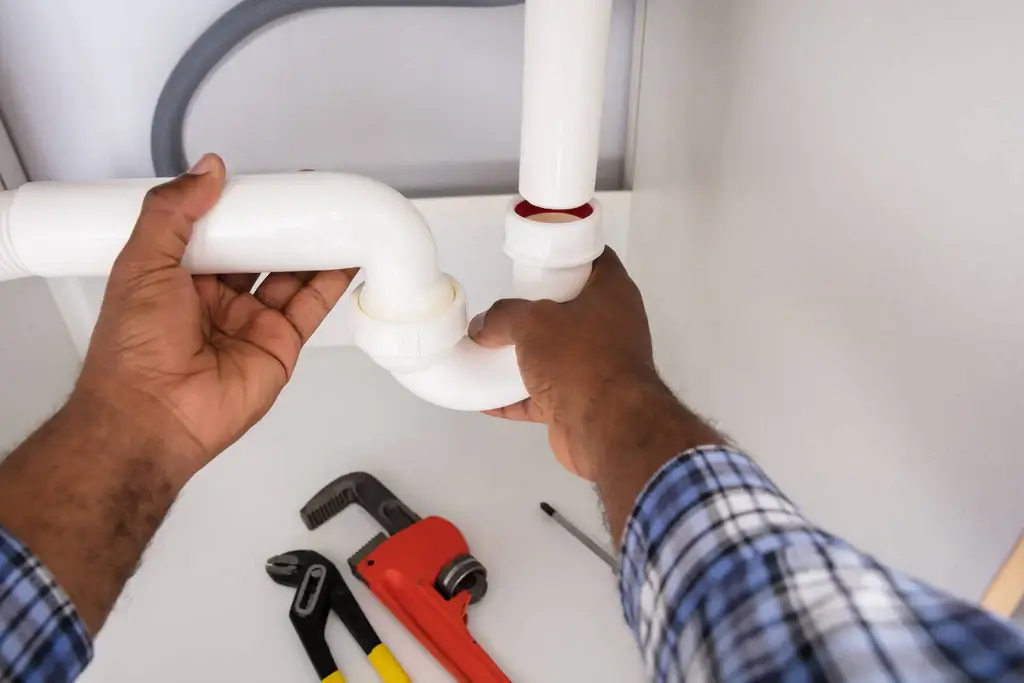Ever wondered how drain cleaners work when you pour them down your sink or bathtub and hope for a miracle? Whether it’s a liquid drain cleaner, drain gel, powder, or even a professional-strength formula, these products seem almost magical. But the reality is—there’s some fascinating chemistry behind the scenes that breaks down those tough clogs and gets your water flowing again.
At Plumbing Amarillo, we want our customers to understand not just what works on clogged drains, but why it works, when to use it, and when it’s time to call in the pros. So let’s dive deep into the drain cleaner chemical world, the types available, how they function, and what you should know to protect your plumbing.
What Is Drain Cleaner Made Of?

A drain cleaner—or drain opener—is a chemical solution formulated to dissolve blockages in plumbing systems. These cleaners can be classified based on their pH level, making them acidic, alkaline (basic), or oxidizing agents.
So, is drain cleaner an acid or base? Well, it depends on the type.
Types of Chemical Drain Cleaners and How They Work

1. Caustic Drain Cleaners (Alkaline)
Caustic cleaners are powerful base compounds, often made with lye (sodium hydroxide) or caustic potash (potassium hydroxide). When poured down your drain, these caustic chemicals used in drain cleaners release hydroxide ions that react with grease and organic materials. This reaction generates heat, breaking down fats and oils into a soap-like substance that washes away easily.
✅ Best for: Greasy kitchen clogs
⚠️ Caution: May soften PVC if overused
🔗 Learn more about how we handle drain cleaning services in Amarillo without damaging your pipes.
2. Oxidizing Drain Cleaners
These use substances like bleach, peroxides, and nitrates. Oxidizers work by causing the clog material to lose electrons through an oxidation reaction. The process releases heat and gas, helping break down hair, food particles, and other organic waste.
✅ Best for: Organic material (hair, food, soap scum)
💡 Connotation: Environmentally safer than acids, but still toxic if misused
3. Acidic Drain Cleaners (Used by Professionals)
Now here’s the heavy artillery. Professional-grade acidic cleaners often contain sulfuric acid or hydrochloric acid, making them extremely powerful and effective. These chemical drain cleaners increase hydronium ions in the water, reacting with clogs at a molecular level and releasing intense heat.
✅ Best for: Tough clogs, soap deposits, mineral buildup
🚫 Not for DIY use: These products can burn skin, damage fixtures, and require professional handling
🔗 Need a serious solution? Our licensed team uses chemical drain cleaners for toilets and sewers only when absolutely necessary—and always safely.
Do Drain Cleaners Damage Pipes?
This is a common concern: does drain cleaner damage pipes? The answer is nuanced. Most drain cleaners for PVC pipes are designed to be safe if used correctly. However, overuse or incorrect application—especially with older metal pipes—can cause corrosion, warping, or leaks.
💡 Pro Tip: If your pipes are older or you’ve had recurring issues, don’t risk damage. Try professional hydro jetting services for a safe, chemical-free solution.
What Chemicals Do Plumbers Use to Unclog Drains?
Professional plumbers often rely on plumber’s acid or commercial chemical sewer line cleaners that are not available to the public. These contain ingredients far more potent than over-the-counter options, and are tailored to treat large-scale or deep clogs in sewer lines and main drains.
The Risks of Using Chemical Drain Cleaners
While chemical drain openers can be effective, they also come with risks:
- Toxicity: They can burn skin, damage eyes, and release noxious fumes
- Environmental Harm: Can disrupt septic systems and damage pipes
- Explosiveness: Mixing different types (like acid and bleach) can cause dangerous reactions
If you’ve accidentally got drain cleaner on skin, rinse immediately with cool water and seek medical advice.
🚫 Avoid trying to unclog your drain with multiple chemicals or combining drain gel with a plunger—it’s a recipe for disaster.
Are Drain Cleaners the Best Long-Term Solution?
No.While sink clog remover liquids, toilet drain cleaners, and bathroom pipe cleaner liquids might offer a quick fix, they often don’t address the underlying issue—especially if your clog is caused by structural problems like pipe collapse, tree roots, or misaligned joints.
For a permanent, safe, and reliable fix, schedule a professional inspection with PlumbingAmarillo.us. We offer comprehensive pipe and drain cleaning using eco-friendly and pipe-safe techniques, including CCTV drain surveys, plumbing gel solutions, and non-corrosive treatments.
What Is the Best Way to Use Drain Cleaner?
If you must use a chemical drain cleaner, follow these safety tips:
- Always read the label—different formulas have different wait times and flushing instructions.
- Use in a well-ventilated area.
- Wear rubber gloves and eye protection.
- Keep children and pets far away.
- NEVER mix products or use alongside other cleaning agents.
Still clogged after use? Don’t keep pouring. Repeating the process can cause chemical buildup or pipe damage.
Instead, call us today at PlumbingAmarillo.us for a safe, effective solution.
Final Thoughts: When to Call a Professional
Understanding how drain cleaners work is useful, but knowing when to step back is crucial. If the clog is persistent, recurring, or affecting multiple drains, DIY chemicals won’t cut it—and might make things worse.
Let Plumbing Amarillo take care of your clogs with our trusted, affordable, and expert drain cleaning services in Amarillo, TX. We serve Amarillo and nearby areas with fast response times, licensed technicians, and long-lasting results.
Need help with a stubborn clog?
📞 Call us or book your appointment online today.
We’ll clear your pipes the right way—without risking damage to your home.



